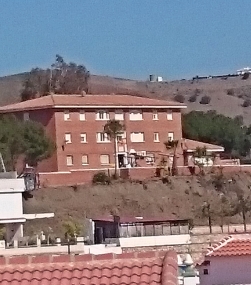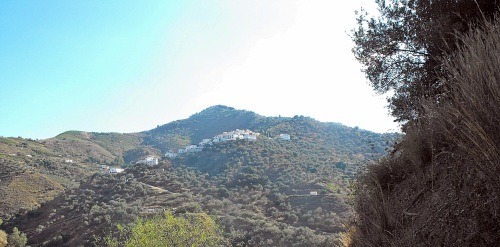There are no police in Cútar so you had better get on with your neighbours. Cútar can’t afford a policeman, so it will be your neighbours and their neighbours who will say what goes and what doesn’t go, who’s in the right and who is in the wrong and whether or not you are a nice person. Offend one person and you may have offended an entire village if they all happen to be related.
It’s not that village people here reject law – quite the reverse, it’s that they are law abiding by instinct. Just try pushing in when there’s a queue. Of course it never looks as though there is a queue. It looks like a mob, but every single person in it knows their place. This is because each new arrival instinctively asks “cual es el última?” Who was the last one to arrive? Law abiding foreigners don’t often get that.
There are two sorts of law in Spain. There is official law, which includes regional (Andalucian) law, the law of Spain and Euro law and we all know what that’s like. Then there is “El costumbre del Pueblo”, or “How we do things here”.
The problem with official Andalucian/Spanish/European Law is that there is so much of it. The law-abiding citizen would be wise to avoid it as far as possible and keep his head down. A Spanish solicitor once advised me never to offer information to the authorities if they hadn’t actually asked for it because “it would make them suspicious”. A Spanish Guardia policeman once told me that he could almost certainly find me in breach of the law if he just looked hard enough. He wasn’t threatening me, just chatting.

To fish in Lake Vinuela you have to enrol on a course, pass an exam, buy public liability insurance, pay a rod licence fee, join the Vinuela fishing club and pay them. Trout not included
If you want to go fishing for example there are five licences – freshwater, freshwater with trout, beach fishing, boat fishing and boat fishing in a group. You have to take a course, pass an exam and get public liability insurance. The laws are made by the Andalucian environment agency who see no difference in public safety between fishing for minnows with a bobble float and blowing wild boar apart with a double barreled shotgun. Locals advise you to ignore the fishing laws, and in many places there is simply no one to enforce this maze of regulation.
In fact, in many areas of everyday life it soon becomes apparent that if you obeyed every regulation you would never do anything. European legislation requiring domestic dogs and cats to be chipped, for example, is entirely ignored. People here in the white villages haven’t even got round to neutering their pets, let alone chipping them. The Town Hall pins up a notice, and people simply don’t admit to owning a cat or a dog. They say they just feed them, put a roof over their heads and take them for walks. The Town Hall doesn’t mind. No one can say it didn’t do its bit.
Then there’s the village shop. It has a bench outside. Sometimes a couple of old men with a can of beer sit on it. The “official” law requires it to have a bar licence and an off licence as well as a grocers licence.
But who is going to enforce all these laws? It’s cheap to write laws but expensive to enforce them and villages have better things to do with their cash than spend it on officials with clipboards. This sort of thing used to drive my old Dad mad. He was for ever complaining that the “Continentals” (actually he meant the French) said one thing and did another and this is quite true, they do.
Take the European directive on straight bananas. Actually we all know (don’t we?) that there was never any such directive. This was just a fantasy headline from the Daily Mail trying to trick the public into buying it’s arse-rag of a newspaper. But suppose it had been true? Well, someone here would have put up a notice and we would all have got on with our lives, straight bananas not withstanding. This is different from the UK, which would have set up straight banana eradication targets, a committee, prosecuted those caught on CCTV eating a straight banana and run straight banana detection vans.

The Guardia police station glares down on Almachar a symbol of the bad a old days and a reminder that there is still no truth and no reconciliation in Spain
When I say “Spanish Law” I am talking of course about everyday law – those domestic regulations that needle us all on a daily basis. I don’t mean burglary, assault and so on. These are serious crimes that call for a serious response and fortunately for us Spain has every imaginable sort of policeman to deal with them. There are local ones, national ones and the Guardia Civil who used to be Franco’s bully boys and now do the traffic. In Almachar you can see the biggest Guardia police station in the Axarquia. It was a garrison used to house the police and their families in the post Civil War days when this was called “Bandit country”. Every year or so they will stroll through Cútar village looking hard with their mirror sunglasses, gelled hair, automatic weaponry and handcuff and truncheon set. On the doors and bonnet of their cars is the hateful symbol of the tied rods and axe. This used to be the emblem of the Roman Centurion and was coined by Benito Mussolini when he became the father of Fascism in 1919.
So local people have mixed feelings about the Guardia. You wouldn’t necessarily go and ask one the time. Of course they no longer get to break your legs just because they suspect you of something. But that isn’t because they don’t want to.
In fact all sorts of authority is mistrusted here. The police because historically they have not shown themselves to be on the side of ordinary people, the legislators in Madrid because Madrid is a long way away and Andalucia views Madrid more or less as Scotland views London.
So the Costumbre del Pueblo is the way neighbours solve problems. This avoids and sometime evades formal law, which is always operated by expensive third party “experts” – lawyers, solicitors, the local and regional authorities and the police. Spanish law recognises the “customs of the village” and will often has a coda that says “So long as nothing in this statute contradicts local customs”. These codas are especially strong in matters such as marriage and land disputes.
So the first principle of the Custom of the village is to Live and let Live. In other words, so long as your neighbour isn’t hurting you or anyone else, don’t shop them to the authorities. Endless petty land disputes that often break into tit for tat vandalism, noise pollution, use and abuse of animals, building development without permission, parking disputes, cleaning disputes, responsibility disputes are all best solved informally. Live and let live is an ancient and special thing that village neighbours can give each other and town neighbours cannot.
The second principle is “Deal with your neighbour”. Yesterday my neighbour’s dog slaughtered my flock of guinea fowl. I had five that I’ve raised for a year and they were about to breed. It was my duty to bring this matter to my neighbour’s attention so I did. My neighbour, who happens to be the Mayor behaved impeccably. He apologised, gave me a rather badly fried almond from the large bowl of nuts he was eating and a small Aspidistra, which I didn’t really want because we have Aspidistras coming out of our ears. More importantly, he wired bits of old bed head and scrap chipboard all over his patio wall “to keep the dog in”. It didn’t, but it did convince observers that he was making every effort to respond to my complaint. In my experience neighbours always respond to a reasonable complaint. No money changed hands. It would not have been costumbre.
The third principle is “Only get outside help as an absolute last resort”. When we first came here someone pinched our wheel barrow. I was going to report it to the police. The neighbours were aghast “Its kids” they said by way of explanation. So I did nothing and somebody’s rusty and battered barrow appeared outside our door a few days later by way of compensation. We duly found our new one down a ravine minus its wheel, which was no doubt on some one’s Go-Kart. What would I have looked like as the Guardia hauled away two children in chains? And they would have done – what’s the point of having chains if you don’t use them?
And the final and most important principle of the Costumbre del Pueblo is that “You can never win, so stop trying! ” Think about it. To bring a “village” action against your neighbour you first have to “denounce” him. This isn’t as bad as it sounds. Denunnciar means to report. So. You might lose the action, which would be the best outcome. But suppose you win and the entire village knows you have done their brother/father/uncle/cousin/second cousin once removed in the eye? They will make you wish you’d lost even when you haven’t!




Thanks Puebloman, too long since we heard from you.
Village life
LikeLike
By: Atholl Campbell on March 22, 2015
at 9:48 am
Sorry, but there are not fascists rods and an axe:
They are the fasces of the Roman lictors (rather the emblem of the etruscan kings).
The arms of the France Republic uses them. They are in the USA Congress in the Speaker box flanking the motto “in God we trust”. etc
The Guardia Civil uses them long before Mussolini, as they do the same as the Roman lictors.
LikeLike
By: jose on June 4, 2015
at 9:27 pm
Thanks for your expert opinion Jose. It’s good to feel that if my research is sloppy, someone will pick up on it!
LikeLike
By: puebloman on June 11, 2015
at 2:30 pm